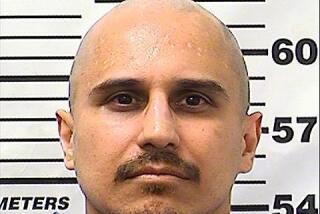Merriman Has Brain Defect, His Attorney Says
- Share via
Convicted killer Justin Merriman suffers from a congenital brain defect and severe psychological problems that should spare him the death penalty, a defense lawyer argued Wednesday.
Attorney Willard Wiksell told jurors he is not making excuses for Merriman, a skinhead gang member who was found guilty of first-degree murder last month in the 1992 slaying of college student Katrina Montgomery.
But Wiksell said untreated mental problems may explain why Merriman killed Montgomery, and offer a reason why he should not be executed.
“He doesn’t know how to stay out of trouble,” Wiksell said. “He is severely impaired.”
The penalty phase of Merriman’s trial got underway Tuesday, but defense attorneys delayed their opening argument until after the prosecution had rested its case.
On Wednesday, Wiksell told jurors they will hear testimony this week from three psychologists who evaluated Merriman and a psychiatrist who conducted a brain scan.
Those experts will say Merriman, a 28-year-old Ventura gang member, suffers from behavioral, learning and psychological problems that were made more severe by prolonged drug and alcohol abuse, Wiksell said.
The problems were first diagnosed by a court-appointed psychologist in 1989--three years before Montgomery’s slaying--when Merriman was facing assault charges in Juvenile Court. But Wiksell said Merriman found no help.
According to court testimony, Merriman was sent to the California Youth Authority and in less than a year was transferred to state prison for attacking a correctional officer.
“He was crying out for treatment,” Wiksell said in his opening statement. “He didn’t get any.”
After Merriman was indicted in 1999 on murder charges, defense lawyers hired Patrick Barker to evaluate him. A Ventura clinical psychologist, Barker frequently works for both prosecutors and defense attorneys in preparing inmate psychological profiles.
In interviews with Merriman and his parents, Barker learned the family was “badly dysfunctional” and that his father was an alcoholic.
The defendant told Barker he began to use drugs early to escape his home life. Merriman’s mother said her son became addicted to methamphetamine at age 11.
School records show Merriman was caught dealing speed in the seventh grade.
Barker reached the same conclusion after giving Merriman psychological tests in 1999. He found Merriman has below-average intelligence--he scored 88 on an IQ test--and poor impulse control. Barker described Merriman as hostile, distrustful, cold and lacking empathy.
Barker diagnosed the defendant as having an antisocial personality disorder. He testified he is certain Merriman would offend again if released from custody.
At Barker’s suggestion, defense attorneys retained neuropsychologist Jordan Witt to determine whether Merriman had ever suffered head trauma.
Witt testified Wednesday that Merriman suffers from a brain defect, not unlike a congenital heart condition.
“His brain was somehow created differently,” Witt said.
Witt told jurors that based on his interviews with Merriman, he concluded the defendant aggravated his condition by using drugs and getting into fights in which he lost consciousness.
But Deputy Dist. Atty. Ron Bamieh took issue with Witt’s diagnosis, challenging his credentials and conclusions, saying they were based on self-serving statements from the defendant.
In other testimony Wednesday, Merriman’s maternal grandmother told jurors she loved her grandson and believes he is innocent. Beverlee Waterhouse helped raise Merriman after his parents divorced when he was 2 years old.
Waterhouse told the jury her daughter, Beverlee Sue Merriman, remarried Dean Merriman, who adopted Justin and his sister, Ember, when they were children.
Defense investigator Fred DeFazio testified he had tried to contact Dean Merriman, who lives in Casitas Springs, but that Dean Merriman wanted nothing to do with the case.
Testimony is scheduled to resume this morning before Superior Court Judge Vincent J. O’Neill Jr.
More to Read
Sign up for Essential California
The most important California stories and recommendations in your inbox every morning.
You may occasionally receive promotional content from the Los Angeles Times.













